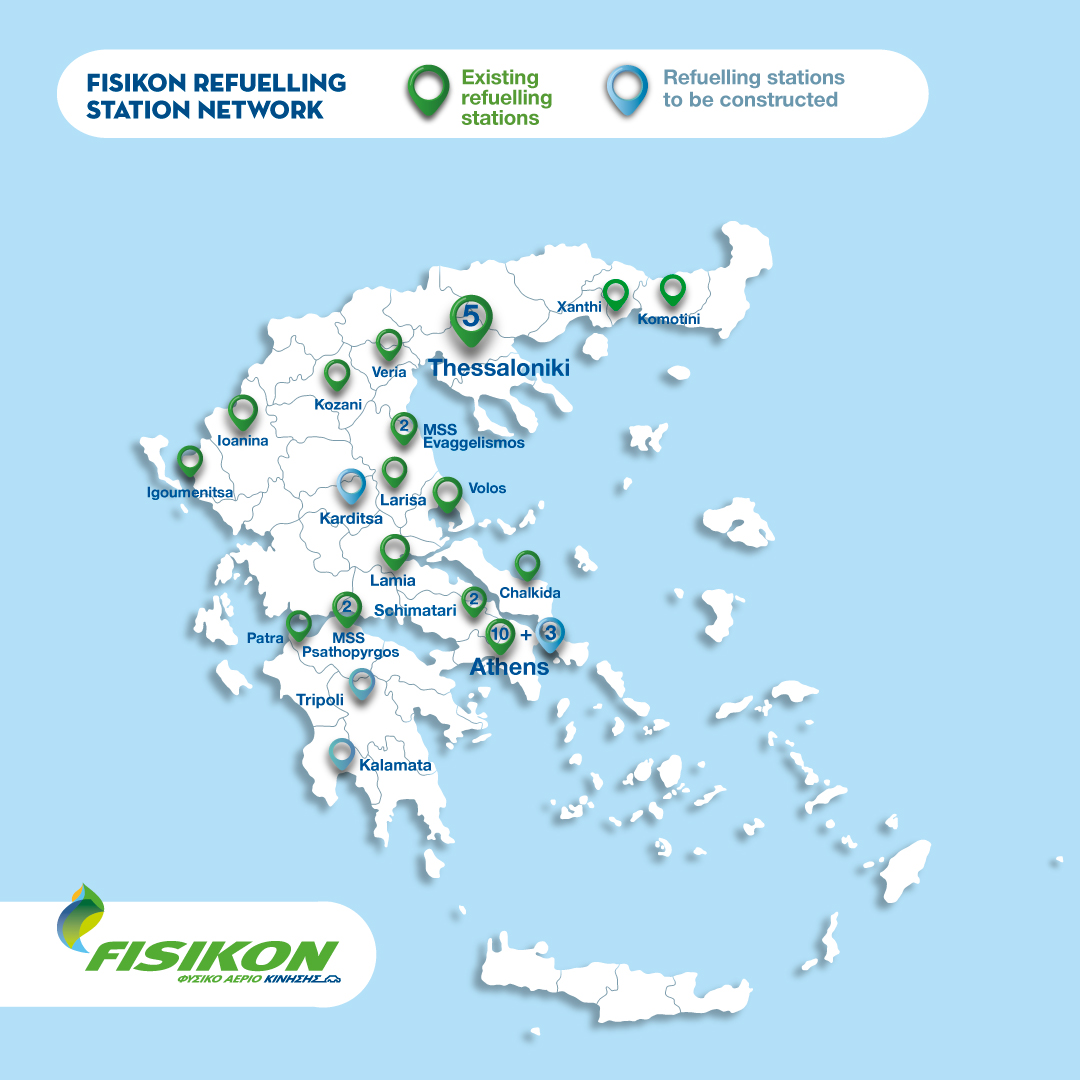
Natural gas is found in nature and is extracted by drilling. It consists mainly of methane and has a low carbon content, which makes it more environmentally friendly.
LPG is a by-product of oil and is produced during refining. Its existence therefore depends on the existence of oil. It is a mixture mainly of propane and butane and has no stable composition.
Natural gas is lighter than air and in the event of a leak it escapes into the atmosphere, while LPG is heavier than air and flows downwards where it can pool into cavities and create an explosive atmosphere.
Natural gas is sold in kilograms (unit of mass). Each kilogram of natural gas provides the same energy as two liters of LPG. Natural gas is much cheaper. In everyday conditions non-professional drivers using natural gas can save up to 40% compared to LPG (calculation done with the current CNG-LPG prices). To calculate the fuel difference, click here
Natural gas is more environmentally friendly with about 30% less CO2 emissions compared to petrol engines. LPG emits 15% less CO2 than petrol engines.
Furthermore, natural gas is distributed through a pipeline system and therefore it cannot be adulterated.
Natural gas is cheaper than petrol, cheaper than diesel and a LPG. CNG (Compressed Natural Gas) is sold in kilograms, not in liters. In terms of performance, one kilogram of natural gas is equivalent to 1.5 liters of unleaded petrol, 1.3 liters of diesel and 2 liters of LPG.
Almost all petrol engines can be converted to become bi-fuel.
Natural gas is a clean and efficient fuel, and its combustion causes much less damage to the engine, reducing thus maintenance costs.
DEPA introduced compressed natural gas (CNG) for the supply of vehicles with natural gas, under the brand name “FISIKON”, to the Greek market. Currently, there are 32 FISIKON fuelling stations in operation: two wholly-owned in Anthousa and Ano Liossia, and 30 operated in collaboration with other companies.
The establishment and further development of FISIKON aimed, from the beginning, at the gradual expansion of the CNG fuelling stations’ network s and the increase of CNG vehicles’ fleet, based on a development plan integrated in the private economy (CNG fueling stations of third companies already operate in Greece) and the fully liberalized, in terms of regulatory framework as well as in practice, Greek natural gas (including CNG) market.
The progress of the FISIKON fuelling station network expansion is presented in the map here-below.

In the case of the conversion of diesel engines, dual fuel technology is used, i.e. both fuels are mixed in the engine.
The conversion of the diesel engine to bi fuel with CNG differs significantly from that of the petrol engine and mainly concerns heavy vehicles travelling on motorways, without frequent stops. In these circumstances it offers a significant savings in fuel costs, as a cost reduction of 25% is achieved.
Vehicles moving in the city at variable speeds have no advantages. For these cases, the automotive industry offers either light trucks or mono-fuel buses, such as the well-known CNG buses and garbage trucks.
You should contact a certified car repair shop with a license to convert vehicles from the Ministry of Environment & Energy.
The use of natural gas in transport contributes to achieving the European objective of tackling climate change.
According to the Renewable Energy Center (CRES), natural gas vehicles are very environmentally friendly with regard to emissions of gaseous pollutants, i.e. emissions affecting human health, such as particulate matter (PM), carbon monoxide (CO ), carbon dioxide (CO2), sulfur oxides (SOx), nitrogen oxides (NOx) and carcinogenic hydrocarbons (HC) cyclic and unsaturated, generated by incomplete combustion of conventional fuels.
Natural gas vehicles have almost zero emissions of particulate matter, zero sulfur oxides (SOx), minimal cyclic hydrocarbons, much less nitrogen oxides (NOx) and less carbon dioxide (CO2). Particles and sulfur oxides are mainly due to diesel engines.
Gas-powered engines produce 25% less carbon dioxide than petrol engines and 35% less than diesel ones.
According to Scientific Institutes, Universities of Europe and North America, natural gas is the safest fuel because of its physical and chemical properties.
It is lighter than air (0,65%) and in case of leakage it escapes upwards and diffuses. It ignites only at a concentration of 5-15% with air and does not explode.
CNG technology is now mature and completely safe.
Natural gas is measured in units of mass and sold in kilograms (kg). The method is very precise and independent of the gas pressure.
1 kg of natural gas is equivalent in energy to 1.5 liters of petrol, 1.3 liters of diesel and 2.0 liters of LPG.
During summer, when temperatures are higher, the gas expands and the tank of the vehicle receives a smaller amount but of the same pressure, while in winter the tank is filled with more gas.
In any case, however, the consumer always pays the quantity he buys, since the measurement is done in units of mass.
